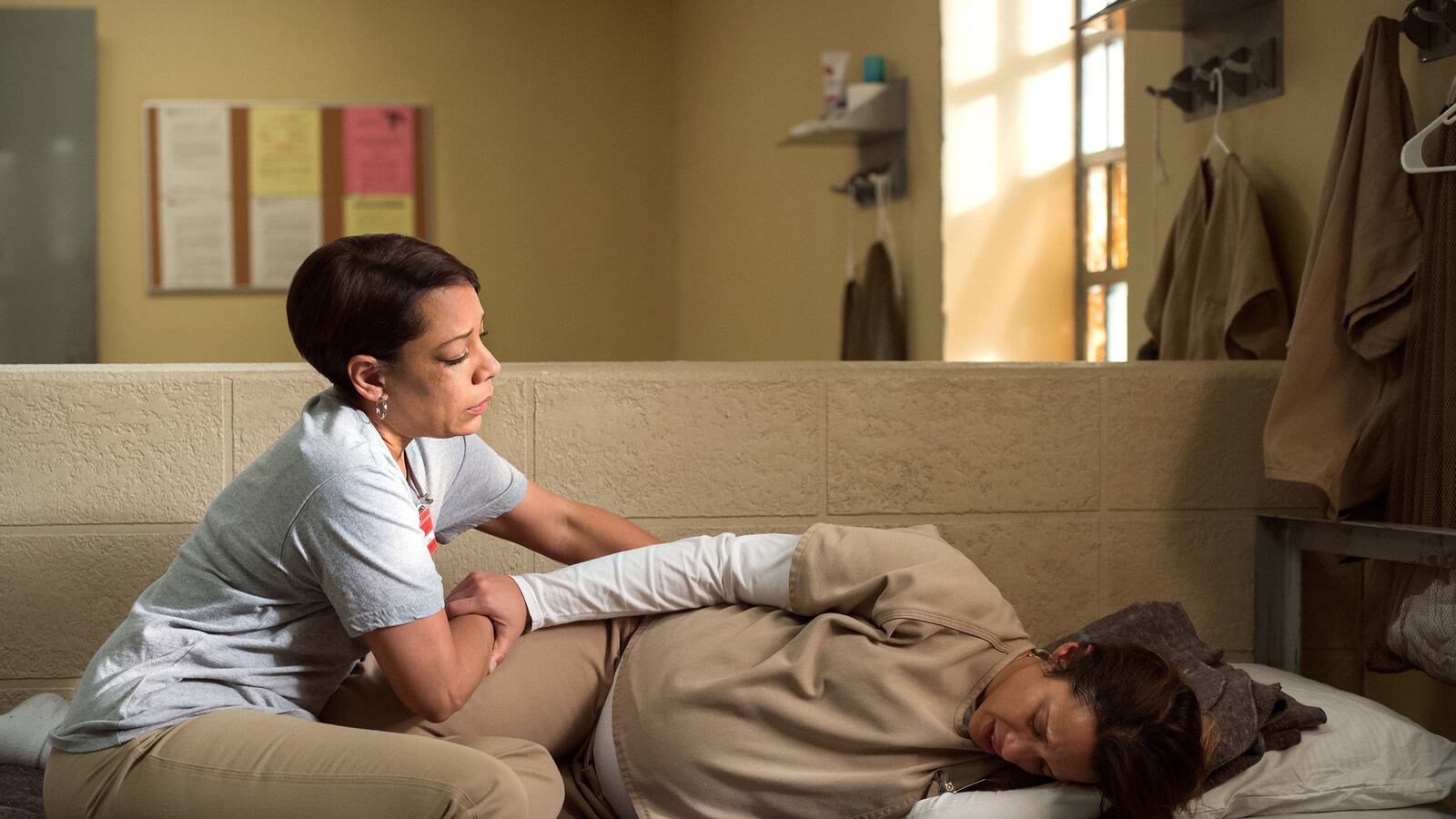Shawanna Nelson was six months into her pregnancy went she was incarcerated. The Arkansas mom-to-be had received a short sentence for a nonviolent offense. Despite this, a guard shackled both of her legs to a hospital bed while she was in labor, and kept her like that until just before delivery.
“Being shackled caused Shawanna cramps and intense pain, as she could not adjust her position during contractions,” reads the ACLU’s recounting of her story. “After childbirth, the use of shackles caused her to soil the sheets because she could not be unshackled quickly enough to get to a bathroom.”
So Nelson and the ACLU went to court, and the 8th Circuit Court of appeals ruled that the shackling violated her constitutional rights.
You might think that would be the end of shackling for incarcerated pregnant women, a traumatizing practice that limits pregnant women’s mobility, exacerbates intense pain during the delivery process, jeopardizes their safety during transportation to medical appointments, and, well, apparently violates the Constitution. Yet only 22 states have laws barring the practice, and because of loopholes, some of those laws have failed to eradicate the often-painful and dangerous restraint of pregnant women.
Now the issue finally is getting some attention on Capitol Hill, with a bipartisan pair of senators teaming up to push federal legislation that would bar the shackling of incarcerated juvenile pregnant women. But, as state-level efforts have shown, these kind of policies are often much easier to pass than to implement. So while advocates of criminal justice and women’s rights applaud their work, they’ve also learned the hard way that good intentions don’t necessarily guarantee results.
Texas Republican Senator John Cornyn and New York Democratic Senator Chuck Schumer are leading the federal efforts to end the practice. The two pushed for an amendment to the Juvenile Justice and Delinquency Prevention Reauthorization Act that bars the shackling of pregnant incarcerated juvenile women from the beginning of the third trimester through delivery. That bill, with the amendment, passed out of the Senate Judiciary Committee last week.
Schumer has also introduced a separate bill—which Cornyn backs—prohibiting the shackling of pregnant juvenile women from the second trimester through delivery. That bill makes no exceptions, and states that don’t comply with the rule could lose the funding they receive through the juvenile justice law. Matt House, a spokesman for Schumer, told The Daily Beast that Cornyn and Schumer soon plan to file legislation that will address the shackling of pregnant adult women.
Yet activists are only cautiously optimistic about Cornyn and Schumer’s efforts.
“It would be a shame to put a lot of energy into passing a law that, in the end, nobody is monitoring in any kind of meaningful way,” said Gavi Wolfe, legislative counsel for the ACLU of Massachusetts.
Wolfe added that without robust reporting requirements, which the Schumer bill lacks, it’s difficult to ascertain how well a policy is being implemented and whether it’s effectively protecting women.
“There needs to be reporting requirements so that there is accountability after the spotlight has turned elsewhere, because that inevitably happens,” said Wolfe. “Everyone agrees shackling is inhumane. They pass the legislation and they don’t watch to see how it is implemented, what happens on the ground.”
Rachel Roth, a women’s health policy consultant who’s worked on a number of anti-shackling efforts, said part of the problem is that there isn’t a great deal of data on how many women give birth while incarcerated and how many of those women are shackled while pregnant. Roughly 4 to 5 percent of adult women who become incarcerated every year are pregnant, per 2014 figures from Department of Justice. That report notes that “there are no concrete figures” for women under 18.
And while we don’t have great figures on how widespread the shackling problem is, Philip Diamond, vice chair of the American Congress of Obstetricians and Gynecologists California, detailed substantial health risks associated with the practice.
“The health risks associated with shackling include increased likelihood of falls, trauma and limited access for treatment during medical emergencies,” he said, per a report from National Task Force on the Use of Restraints with Pregnant Women under Correctional Custody. “Similarly, minor forces may be sufficient to shear the placental attachments and increase the risk of a placental abruption after blunt abdominal trauma.”
In other words, it’s really bad news—traumatizing at best, and in some cases potentially lethal. Plus, pregnant women aren’t usually huge flight risks.
“It’s very unlikely that she’s going to run away or that she’s going to get very far if she does,” said Roth.
But the practice persists around the country, even in places where it’s supposedly illegal. In 1999, Illinois became the first state to ban shackling, but the state’s Cook County Jail still paid a $4.1 million settlement in 2012 to a group of about 80 women who joined a class-action lawsuit alleging they were shackled while in labor.
Many shackling bans carve out exceptions for situations where corrections staff feel the practice is necessary for the health and safety of the incarcerated women or those around them. But most don’t have robust reporting requirements, which makes it difficult to hold staff members accountable for their decisions about when and whom to chain. And not all incarcerated pregnant women know their rights—and not all corrections staff know the rules.
On top of that, cultural problems often make staff resist change.
“There’s just a way that prisoners are treated and they treat everyone the same, whether they’re pregnant or not,” said Megan Amundson, the executive director of NARAL Pro-Choice Massachusetts, who worked with a coalition of activists to ban the practice in the Bay State.
“They’re not seen as pregnant women,” Amundson continued. “They’re just seen as prisoners.”
And being seen as pregnant doesn’t necessarily help. Matt Simpson, the senior policy strategist at ACLU of Texas, said one sheriff on the state’s Commission on Jail Standards argued during a hearing that women should be shackled because he once heard a story about a woman giving birth after running a marathon.
“I read that a woman ran a marathon and then gave birth almost immediately afterwards,” Simpson said, paraphrasing the sheriff. “To me that’s proof that all women should be shackled if they’re pregnant, if they could run a marathon.”
“There’s a culture to some degree of just assuming anybody in a jail is lying about their medical condition,” Simpson added. “It’s very rare that a woman is taken seriously.”
And changing that culture has proven incredibly difficult. Massachusetts banned the use of restraints on women in their second or third trimester of pregnancy, but activists still heard stories about pregnant women being held in restraints.
“That isn’t what we’ve been seeing on the ground,” Amundson said, adding that loopholes in the language have resulted in less-than-perfect enforcement of the ban. “It’s been a little frustrating.” So now activists are headed back to the Massachusetts statehouse to tighten the language.
“One thing that we’ve learned, unfortunately, is that oftentimes people work really hard to get these laws passed and then prison and jail officials and staff ignore them in practice,” said Roth, who has spent years fighting shackling. “And that’s often because there’s no enforcement mechanism.”






